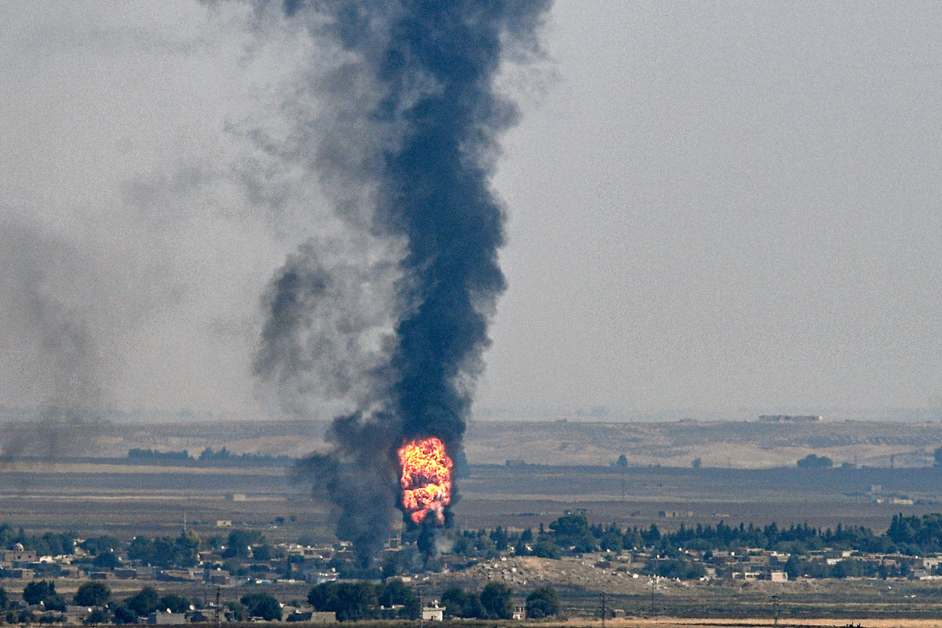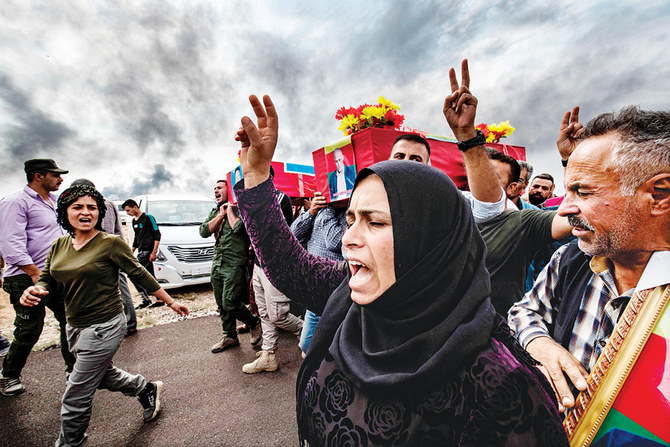ANKARA: Accusations that Turkey has used banned incendiary weapons against civilians in its invasion of northern Syria are credible, a leading security analyst told Arab News on Saturday.
Kurdish leaders said Turkish President Recep Tayyip Erdogan’s fighter jets had dropped munitions containing napalm and white phosphorus on civilian targets in the border town of Ras Al-Ain, a key objective for Turkish troops.
“The Turkish aggression is using all available weapons against Ras Al-Ain,” the Kurdish administration said. “Faced with the obvious failure of his plan, Erdogan is resorting to weapons that are globally banned, such as phosphorus and napalm.”
Nicholas Heras, an analyst at the Center for New American Security, told Arab News: “There are now multiple credible reports that Turkey has used white phosphorus munitions in its campaign in northeast Syria, and especially against the stubborn defenders of the city of Ras Al-Ain.”
The attacks on Ras Al-Ain are being investigated by UN chemical weapons inspectors, the Organization for the Prohibition of Chemical Weapons (OPCW), and Human Rights Watch.
OPCW said it had “not yet determined the credibility of these allegations,” and its inspectors were monitoring the situation.
If the use of banned incendiary weapons were proved, it would be a grave violation of Turkey’s pledge to wage war with concern for civilian lives, Heras said.
HIGHLIGHTS
- Erdogan’s jets ‘dropped munitions containing napalm and white phosphorus in Ras Al-Ain.’
- The attacks are being probed by UN chemical weapons inspectors and Human Rights Watch.
- A video posted on social media shows children with burns that a doctor says were consistent with the use of banned weapons.
Rami Abdel Rahman, head of UK-based monitoring group the Syrian Observatory for Human Rights, said there had been a spike in burn wounds treated at the Syrian-Kurdish hospital at Tal Tamir, mostly casualties brought in from the Ras Al-Ain area.
The Kurdish Red Crescent said at least six people were being treated in hospital for burns.
Kurdish officials posted a video on social media showing children with burns that one doctor in Hasakeh province said were consistent with the use of banned weapons.
Hamish de Bretton-Gordon, a British chemical weapons expert, told the UK newspaper The Times that the burns appeared to have been caused by white phosphorus.

This picture taken on October 17, 2019 shows smoke and fire rising from the Syrian town of Ras al-Ain during the Turkish offensive against Kurdish groups in northeastern Syria. Kurdish authorities in northeastern Syria accused Turkey of resorting to banned weapons such as napalm and white phosphorus munitions. (AFP / Ozan Kose)
The substance may be used to create a smoke screen, or as a battlefield marker, especially at night, but its use as an incendiary weapon is prohibited under international law.
Since 1997, Turkey has been a signatory to the Convention on the Prohibition of the Development, Production, Stockpiling and Use of Chemical Weapons and on their Destruction.
Dr. Willem Theo Oosterveld, a senior fellow at the Hague Centre for Strategic Studies, said the deployment of white phosphorus was not explicitly prohibited by the Geneva Conventions.
However, he said, under humanitarian law “the use of means and methods of warfare which are of a nature to cause superfluous injury or unnecessary suffering is prohibited.”






















